Sued Over Policies on Transgender Children, American Academy of Pediatrics Pulls Forthcoming Book, Takes Steps To Protect Emails From Prying Eyes
The AAP is facing a lawsuit from a woman who underwent a female-to-male medical transition at age fourteen, which she later ceased and regretted.
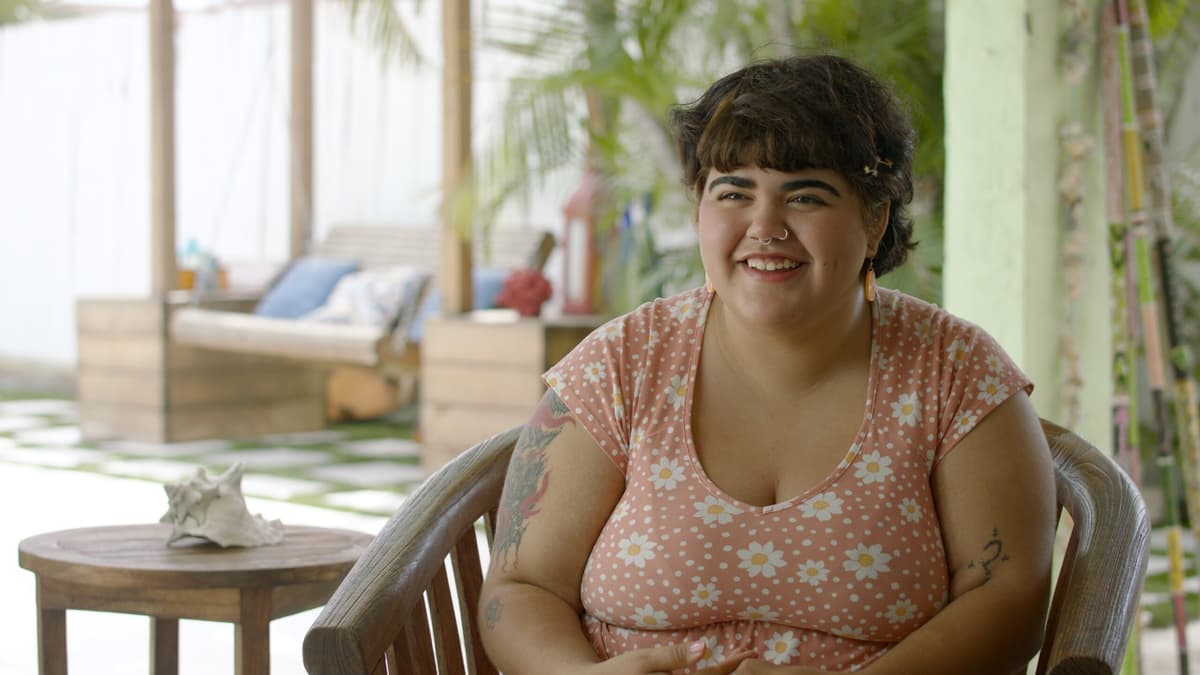
The American Academy of Pediatrics, under fire for its policies on gender-transition treatment for minors, is taking steps that might limit its legal exposure — or at least minimize public scrutiny — in the face of a lawsuit by a woman who at 14 underwent a medical gender transition that she later regretted.
This month, the highly influential medical association, which has about 68,000 pediatrician members, shelved a pending book on the care and treatment of children who identify as transgender. Its chief executive officer instructed those members who have leadership roles within the organization — but who are employed by medical practices or universities — only to use personal email accounts for AAP-related correspondence. This could protect such emails from freedom-of-information requests and employers’ document-retention policies.
An AAP representative told the Sun that neither move was related to the litigation it faces and that the board’s decision to enact the new email policy predated the filing of the lawsuit in question.
“The AAP has been under scrutiny for a couple of years now because of its gender policies,” said a fellow at the Manhattan Institute, Leor Sapir. He speculated that the organization’s new email policy could have been motivated by such ongoing external pressures, which also predated the lawsuit.
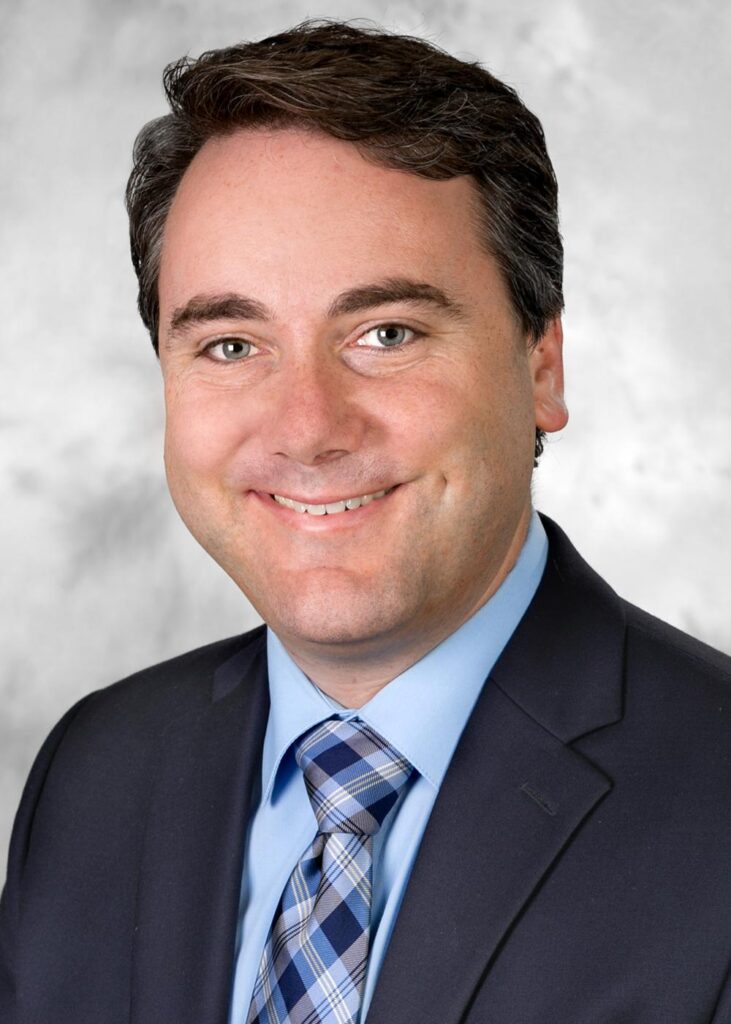
Mr. Sapir argues that the AAP and the American medical establishment more broadly have failed to establish “in a thoughtful and scientific way” its guidelines for pediatric gender-transition treatments. Consequently, he said, he supports controversial state laws that ban the prescription of puberty blockers and cross-sex hormones to children to treat gender dysphoria — a psychiatric diagnosis that involves significant distress over a conflict between an individual’s gender identity and their biological sex.
A number of states with Republican-controlled legislatures have passed these laws since 2021 as part of a concerted pushback against medical care practices, first imported to the United States from the Netherlands in 2007, for children who identify as the opposite gender. The Republican-dominated Ohio legislature last week passed a bill that would make the state the 22nd to ban such medical treatment. The governor of Ohio, Mike Dewine, a Republican, has yet to decide if he will sign the contentious bill. If he does not sign or veto it by December 29, it will become law.
The AAP has maintained full-throated support for the availability – and legality – of medical gender-transition treatments for children. Its influential journal Pediatrics on Wednesday published an essay by a pediatrician at Seattle Children’s Hospital, Dr. Emily Georges, and two colleagues arguing that banning such medicine is “a form of child maltreatment.”
“These legislative efforts operate under the guise of protecting children,” Dr. Georges and her coauthors wrote. “In reality, they punish caregivers and physicians when they choose to support children.”
The AAP Faces a Lawsuit
In October, a Dallas law firm filed a lawsuit against the AAP on behalf of a biological woman, Isabelle Ayala, who beginning at age 14 was treated for gender dysphoria with testosterone by a group of Rhode Island health care providers; they are also named as defendants. On this team was a child psychiatrist and pediatrician trained by and affiliated with Brown University, Dr. Jason Rafferty, who is the sole author of the broadly influential policy statement on pediatric gender-transition treatment that the AAP published in October 2018, a few months after Ms. Ayala left his care.
“In hindsight, that makes me feel like a guinea pig,” Ms. Ayala, 20, said in a YouTube video posted last week by the Independent Women’s Forum, a conservative nonprofit.
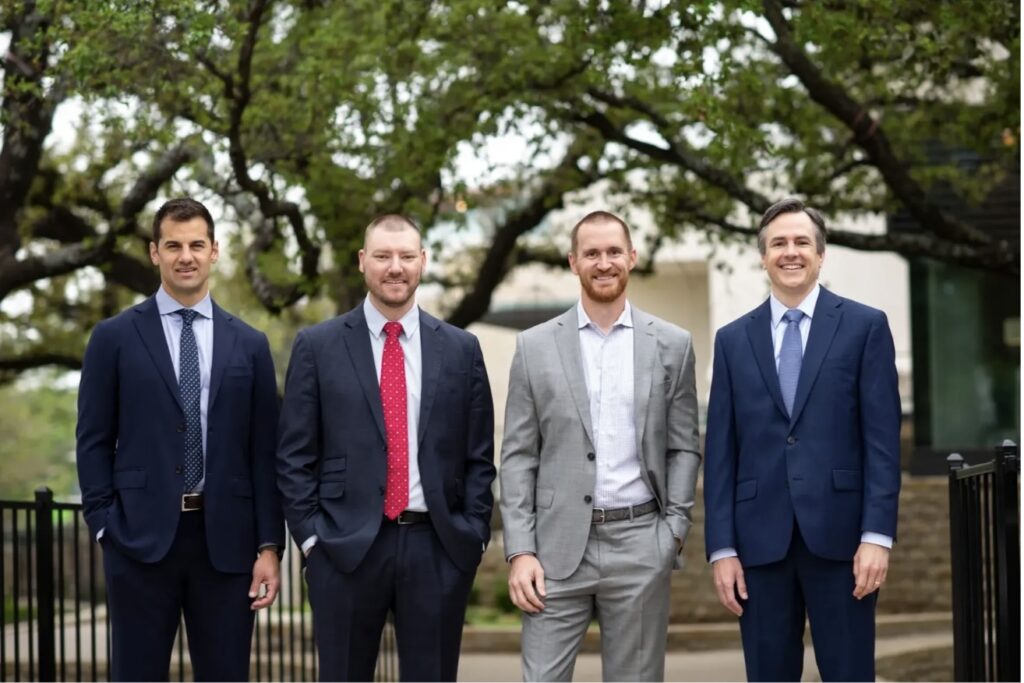
A retired pediatrician, AAP member and volunteer professor of pediatrics at the University of Cincinnati College of Medicine, Dr. Christopher Bolling, defended the AAP’s integrity from what he said was a “talking point from transgender care ban advocates” that Dr. Rafferty “somehow wrote the whole thing and forced everyone else to just sign it.” Dr. Bolling was not himself involved with developing the policy statement in question, but said, “Writing those statements are some of the most collaborative labor-intensive, careful processes I’ve ever been involved with.”
Ms. Ayala ultimately “detransitioned,” reverting from considering herself a trans male to identifying as her birth sex. The law firm representing her, Campbell Miller Payne, was recently established by four white-shoe attorneys solely to represent such regretful so-called detransitioners. The firm is behind five of the nine known medical-malpractice detransitioner lawsuits.
Time Magazine reported Thursday that the threat of such litigation is already driving up malpractice insurance premiums for providers of pediatric gender-transition treatment, shutting out some smaller gender clinics.
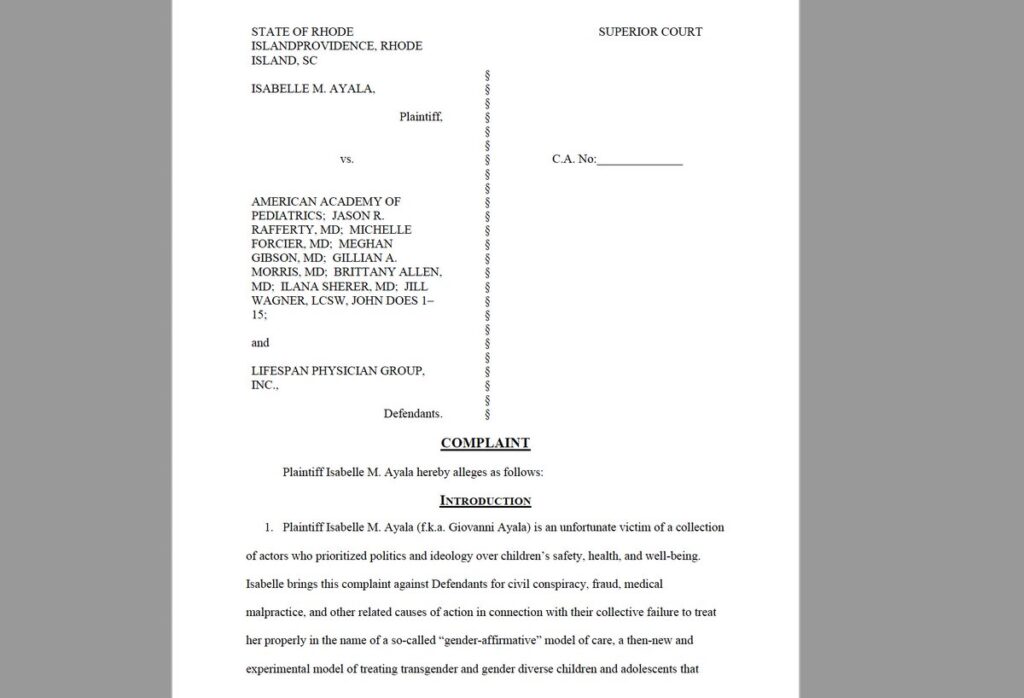
Ms. Ayala’s suit accuses Dr. Rafferty and his colleagues of malpractice for prioritizing treating her gender dysphoria over her myriad other psychiatric diagnoses and for allegedly causing her lasting physical harm.
“I don’t even like to think about my fertility,” Ms. Ayala said in a voice over in the YouTube video as she looked at a baby crib, addressing concerns about the long-term impacts of testosterone treatment. “It is my greatest fear to go to the gynecologist and have them tell me I can’t have children over some decisions that were made when I was fourteen.”
The suit further alleges that Dr. Rafferty and others engaged in a conspiracy with the AAP to develop methods for treating gender dysphoric children while Ms. Ayala was the physicians’ patient that are not evidence based and are grounded in what a scathing peer-reviewed critique published in 2019 argued was a misrepresentation of the relevant scientific literature.
In their new Pediatrics essay, Dr. Georges and her coauthors countered such a premise. Referring to what supporters of such treatment call gender-affirming care, they wrote: “Although some individuals make it seem that GAC is a new, experimental area of medicine, GAC is evidence-based.”
They continued: “The benefits of GAC, most notably on mental health, self-esteem, and development, outweigh the risks in the majority of circumstances. GAC is, for many, lifesaving.”
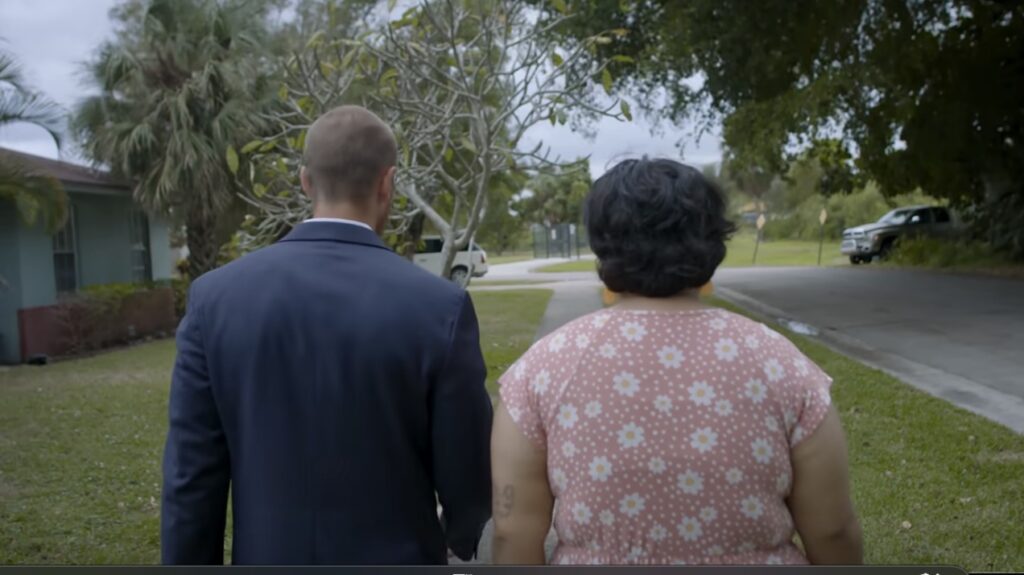
This is a reference to suicide prevention. Advocates of medical gender transitions for children argue that gender dysphoric youth are at high risk for death by suicide if they are not able to medically transition if they so choose.
The AAP Pulls a Book on the Gender-Affirming Care Model
During the fall, the AAP began taking pre-orders for a 320-page book on pediatric gender-transition care and treatment that was set to be published on January 30. Dr. Rafferty was listed first among the authors of the book’s commentaries.
On December 6, the day after the Sun published an article about Ms. Ayala’s suit and another malpractice suit filed against Dr. Rafferty and his colleagues by a detransitioned adult patient, the AAP emailed those who had pre-ordered the book, alerting them: “Due to an upcoming policy review on this topic, the publication of this book has been placed on hold.”
A representative for the organization confirmed to the Sun that the email referenced the AAP leadership’s announcement in August that it would commission an independent systematic literature review — the gold standard for assessing scientific evidence — of the research regarding pediatric gender-transition treatment. The AAP said at the time that it was prompted to take this step out of “concerns about restrictions to access to health care with bans on gender-affirming care.”
An AAP member and a pediatrician at Carmel, Indiana, Dr. Sarah Palmer, criticized the academy’s expressed motivation, which she said centered the pending review “in the political realm instead of in the clinical and scientific realm where doctors should apply their expertise.”

The AAP representative said that the book contains research previously published in the academy’s journals and no new guidance. It does, however, contain the new commentaries. The representative said the AAP decided to delay publication “to avoid confusion” during the “ongoing” work on the review, the findings of which the academy plans to share publicly. However, the book went on sale for pre-order well after the literature review was announced. The representative declined to respond to detailed questions about the review’s progress, including whether the AAP would observe typical scientific protocol for a systematic literature review and publish its criteria in advance.
In reference to the AAP’s publication of Dr. Georges’ unsparing and politically charged new Pediatrics essay, Mr. Sapir said, “It’s weird that they would pull the book on the grounds that there is an ongoing systematic review, but in their own peer-reviewed journal they would publish this document.”
The AAP’s move to conduct the systematic review came after three years of efforts led by an AAP member and Gresham, Oregon-based pediatrician, Dr. Julia Mason, to compel the organization to do so. She, Dr. Palmer, and Mr. Sapir all expressed concern about what they characterized as the AAP’s lack of transparency during the four months since announcing it would commission the systematic review.
“I think the pressure of the lawsuit led to their pulling the book. Because they suddenly realized that they might be held responsible for what that book said in a court of law,” said Dr. Mason, who is a board member of the Society for Evidence Based Gender Medicine. Founded in 2020, the society is a collective of clinicians and researchers who share concern that, as multiple systematic reviews of the relevant evidence have found, pediatric gender-transition treatment is based on a low or very low quality of scientific evidence while it comes with considerable risks, including infertility and sexual dysfunction.
In conflict with the Pediatrics essay, such reviews have also not found evidence that withholding puberty blockers and cross-sex hormones from gender dysphoric youth is associated with a higher suicide death rate. Additionally, Dr. Mason and numerous other critics have called into question the validity of the findings of a 2022 University of Washington and Seattle Children’s study often cited by supporters of such treatment, including in the new Pedatrics article’s authors, as evidence that medical gender-transition treatment reduces suicidal thoughts and behaviors in gender-dysphoric adolescents.

Transgender activists have called the Society for Evidence Based Gender Medicine an anti-trans group and highlight how commonly other medical treatments are backed only by low quality evidence. The type of randomized, placebo-controlled trials that would produce the highest quality of evidence, trans advocates argue, would not be ethical for pediatric gender-transition treatment.
A sprawling Southern Poverty Law Center report published December 12, “Combatting LGBTQ+ Pseudoscience,” places the Society for Evidence Based Gender Medicine at the nexus of what it portrays as an interconnected conspiracy by various organizations to undermine support for pediatric gender-transition treatment and harm trans youth. The Southern Poverty Law Center has come under criticism from social conservatives in recent years for, they argue, unfairly and egregiously classifying some conservative groups as “hate groups.” The Society for Evidence Based Gender Medicine, however, bills itself as an apolitical science organization.
Maintaining Ownership of Internal Emails
Earlier this month, the AAP’s chief executive officer, Mark Del Monte, and chief medical officer, Dr. Anne R. Edwards, sent a letter to what the AAP representative reported was all of the academy’s staff and hundreds of non-staff members in leadership roles, alerting them to a new correspondence policy, effective January 1. It ordered the members only to use personal email accounts, such as Gmail, for leadership level AAP-related business.
The AAP representative told the Sun that the decision to enact this new policy was unrelated to Ms. Ayala’s lawsuit and predates its filing, having been made at an AAP board meeting in May; minutes from the meeting indicate as much.
Mr. Del Monte and Dr. Edwards differentiate in the letter between the public nature of the AAP’s “policy, advocacy positions, and educational resources” and the “confidential, internal discussions” pertaining to these documents’ development.
“To protect the internal deliberations of our member experts,” the letter states, “the AAP Board of Directors has approved new prudent steps to keep internal communications under the control of the AAP and its member leaders.”
The letter continues: “While we regret that this action is necessary, members do not ‘own’ their work email and so do not necessarily have the decision-making authority about whether or not to release it publicly.”
The use of institutional or workplace email accounts, the letter further states, creates “multiple vulnerabilities for AAP and our members.” This includes the fact that “employer-sponsored email platforms are subject to the document retention and release policies of external institutions, including in response to subpoenas or Freedom Of Information Act (FOIA) requests.”
The board’s decision to enact this policy, the AAP representative said, “followed a lengthy deliberation by board members to ensure the AAP manages records in compliance with applicable federal and state laws, while meeting operational needs.”
A medical doctor and tort law expert at the University of Baltimore School of Law, Dr. Gregory Dolin, said he anticipated that a shift from workplace to personal email accounts for such correspondence would not frustrate any attempts by Campbell Miller Payne to obtain internal AAP emails through discovery in its suit against the academy. However, Dr. Dolin said that by forbidding communicating via email accounts subject to FOIA requests, the AAP “may reduce non-litigation related, but nevertheless embarrassing disclosures” by, for example, journalists.
Protecting Children
A professor of epidemiology and biostatistics at the University of California, San Francisco, Dr. Vinay Prasad is an outspoken critic of what he has characterized as unscientifically sound Covid-19-mitigation public-health policies. On Monday, he published an essay on the Sensible Medicine Substack criticizing the AAP for asserting that for obese patients, pediatricians “should offer” adolescents and “may offer” children ages 8 to 11 weight-loss drugs such as Ozempic.
Meanwhile, the United States Preventive Services Task Force asserted in a draft guidance released December 12 that evidence was insufficient, in particular concerning the long-term impacts of such medications, to make such a recommendation. The task force called for more research.
In an email, Dr. Prasad argued that the AAP’s policies regarding gender-transition treatment represent a pervasive lack of adherence to evidence-based standards.
“I am deeply concerned that, across all their recommendations, the American Academy of Pediatrics does not rely on the highest quality of evidence, and worse, they do not call for better studies,” said Dr. Prasad. “Instead, they’re very happy to make strong recommendations based on their own biases in the absence of evidence. And that harms children.”
Dr. Georges, by contrast, wrote in Pediatrics that any state law denying children gender-transition treatment “not only represents medical neglect, but it is also state-sanctioned emotional abuse.”

